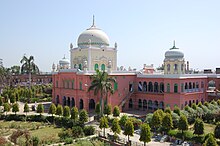Darul Uloom Deoband
دَىوبَنْدِدَارَالْعُلُومْ دِىُوبَنْدْ | |
 | |
| Type | Islamic university |
|---|---|
| Established | 31 May 1866 |
| Founders | Muhammad Qasim Nanautavi, Sayyid Muhammad Abid and others. |
| Rector | Abul Qasim Nomani |
| Location | Deoband , , |
| Nickname | Darul Uloom |
| Website | www |
Darul Uloom Deoband is an Islamic seminary in India. It is the birthplace of Sunni Deobandi Islamic movement. It is located in Deoband, a town in Saharanpur district, Uttar Pradesh. It was founded in 1866 by Muhammad Qasim Nanautavi.
History
Darul Uloom Deoband was established on 31 May 1866 by Muhammad Qasim Nanotawi and other scholars in his circle. The founders include Sayyid Muhammad Abid, Mehtab Ali and Nehal Ahmad (brother-in-law of Muhammad Qasim Nanautavi).[1] Mahmud Deobandi was appointed as the first teacher, and Mahmud Hasan Deobandi was the first student who enrolled in the seminary.[2]
It played an important role in the Indian independence movement. It opposed the Two-state solution proposed by All-India Muslim League.
Vice-Chancellors
- Sayyid Muhammad Abid (1866 - 1867)[3]
- Rafiuddin Deobandi (1867 - 1868)[3]
- Sayyid Muhammad Abid (1869 - 1871)[3]
- Rafiuddin Deobandi (1872 - 1889[3]
- Sayyid Muhammad Abid (1890 - 1892[3]
- Fazl Haq (1893 - 1894)[3]
- Muneer Ahmad Nanautawi (1894 - 1895)[3]
- Hafiz Muhammad Ahmad (1895 - 1930)[4]
- Habibur Rahman Usmani (1928 - 1929)[3]
- Muhammad Tayyib Qasmi (1928 - 1980)[5][6]
- Marghubur Rahman Bijnori (1982 - 2010
- Ghulam Muhammad Vastanvi (10 January 2011 - 24 July 2011)[7]
- Abul Qasim Nomani Banarsi (2011 - present)[7]
References
- ↑ Syed Muhammad Miyan Deobandi, Ulama-e-Haqq Aur Unke Mujahidana Karname, Vol 1, Page 22-23
- ↑ Metcalf, Barbara (1978). "The Madrasa at Deoband: A Model for Religious Education in Modern India". Modern Asian Studies. 12 (1): 111–134. doi:10.1017/S0026749X00008179. JSTOR 311825. S2CID 145793477.
- ↑ 3.0 3.1 3.2 3.3 3.4 3.5 3.6 3.7 Syed Mehboob Rizwi. "Arbab-e-Ehtemam". History of The Dar al-Ulum Deoband (Volume 2) (PDF). Translated by Prof. Murtaz Husain F. Quraishi (1981 ed.). Idara-e-Ehtemam, Dar al-Ulum Deoband. pp. 164–178. Retrieved 9 May 2020.
- ↑ Ernst, Carl W.; Martin, Richard C. (27 November 2012). Rethinking Islamic Studies: From Orientalism to Cosmopolitanism. University of South Carolina Press. ISBN 978-1-61117-231-7. Retrieved 9 May 2020.
- ↑ Mufti Taqi Usmani. "Qari Muhammad Tayyab". Nuqoosh-e-Raftgaan (in Urdu) (April 2007 ed.). Karachi: Maktabatul Maarif. pp. 193–194.
- ↑ Nur Alam Khalil Amini. Pas-e-Marg-e-Zindah (PDF) (in Urdu). Idara Ilm-o-Adab, Deoband. pp. 108–172.
{cite book}:|website=ignored (help) - ↑ 7.0 7.1 Ghosh, Abantika (24 July 2011). "Vastanvi axed as Darul V-C for praising Modi". The Times of India. Archived from the original on 8 September 2011. Retrieved 21 October 2012.
Other websites
Wikimedia Commons has media related to Darul Uloom Deoband.
- Official website

- Tabassum F. Deoband Ulema's Movement for the Freedom of India. Jamiat Ulama i-Hind, New Delhi, pdf at Attahawi blog, July 2007.
- Deobandi Islam Global security organisation website.
- Metcalf B. ""Traditionalist" Islamic Activism: Deoband, Tablighis, and Talibs.". Archived from the original on 2009-01-18. Social Science Research Council, non-profit organisation, Brooklyn, New York.
- Reetz, Dietrich; Sikand, Yoginder; Bruinessen, Martin van (2008). "Change and Stagnation in Islamic Education: The Dar al-ʿUlum of Deoband after the Split in 1982". The Madrasa in Asia. Amsterdam University Press. pp. 71–104. ISBN 978-90-5356-710-4. JSTOR j.ctt46n10w.6. Retrieved 23 October 2020.